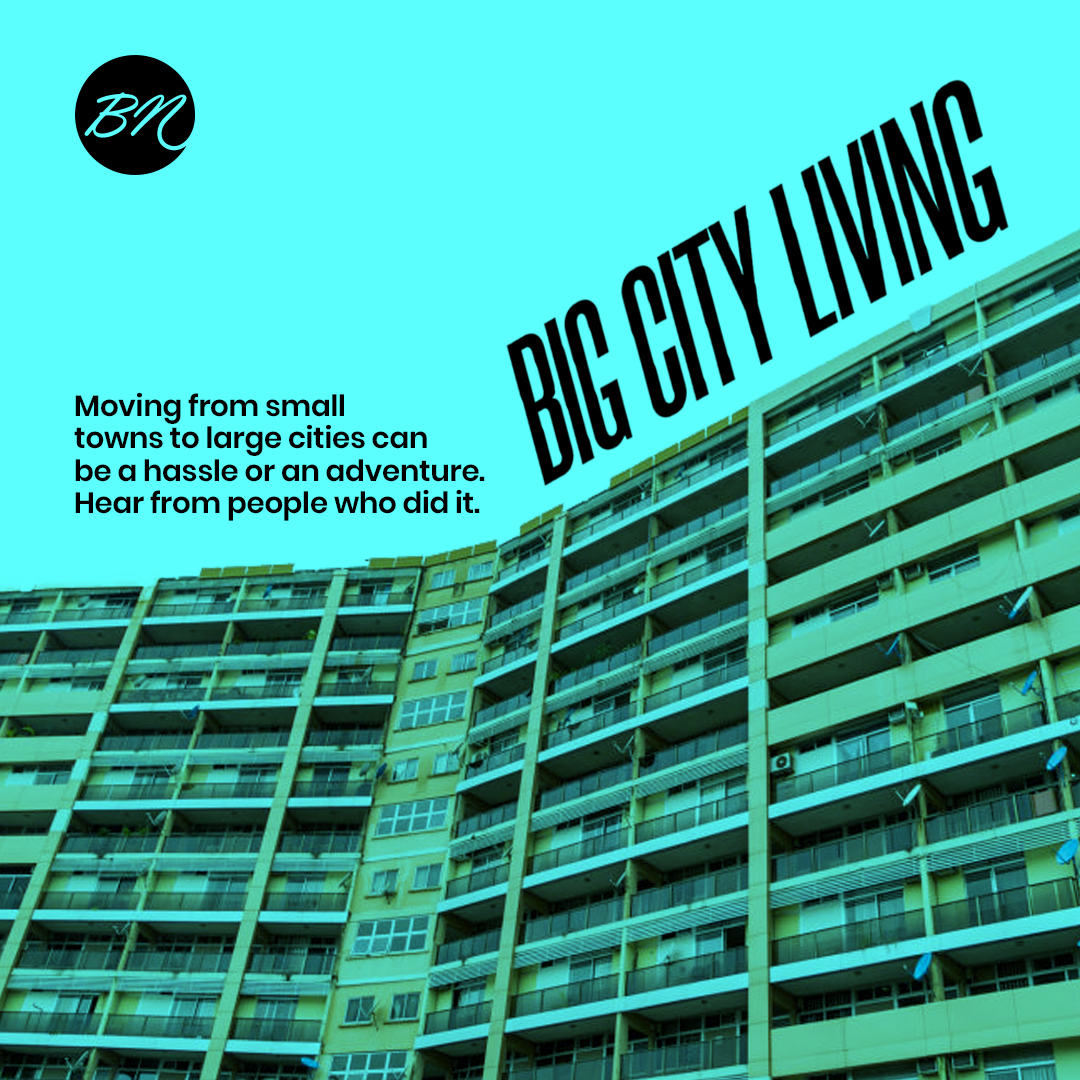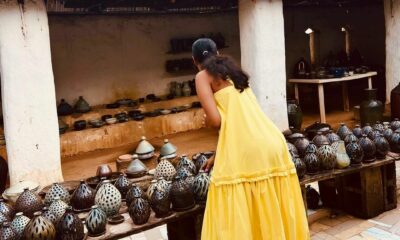Features
Couldn’t Wait to Leave Calabar & Got Stabbed in Abuja – Anthonia Shares her Big City Living Story
I like to say that Abuja reminds me a lot of Calabar in its calmness and serenity. Because of those similarities, my relocation was fairly seamless. I didn’t have a hard time getting used to the people or the pace because they were fairly reminiscent of Calabar. It was my first time, however, being among Muslims, and I soon shed my preconceived biases.Transportation was a little bit more difficult to get the hang of, because unlike Calabar, I found that everywhere was not within reach
Here’s Big City Living, a seven-part series where people who lived their childhood in small rustic towns share their experience of moving to big cities in adulthood. It’s something a lot of our parents did, something a lot of us are now doing.
Anthonia, a 27-year-old fashion and arts enthusiast, who just couldn’t wait to leave the sleepiness of Calabar, shares her experience.

I grew up fairly sheltered in Calabar Municipality, a Local Government Area in the heart of Calabar, an old town in Cross River State. I wouldn’t categorically call Calabar small or rustic, but it is sleepy in a way that towns like Abuja and Lagos are not.
Being the only child of my folks ensured that I got most of the things I needed, and, maybe, even wanted. But it also meant that I was constantly under watch. My nursery school was a stone throw away from home, and when I left for boarding school it was close enough for my mum to visit me every weekend.
Visiting Big City Abuja as a Kid
Far back in nursery school, I had the chance to visit Abuja for the first time with my mum. I remember getting off the plane and riding through the city, doe-eyed and impressed at the possibility of such wide roads. After the wedding formalities we came for were concluded, we spent some time looking around and getting acquainted with the people. Maybe it was the roads or just the semblance of freedom and opportunities that a city like that presented, but I decided then that somehow, I was going to end up in the capital.
The Different Attempts (and Failure) to Begin Big City Living
I couldn’t wait to leave the ever-watchful eyes of my mother. Oh, had I known! I attempted to flee the first time when the opportunity came to pick a university. I went through my JAMB brochure looking for schools that were farthest away from home. After almost being robbed on our way to the University of Nigeria, Nsukka, in Enugu for the aptitude test, and not getting admitted into the University of Port Harcourt, I came back home and went to the University of Calabar, Cross River State. Twice, I tried and failed to move into my school hostel, but my mum was adamant about my schooling from home.
My second chance at leaving home came with the National Youth Service Corps, and naturally, I picked Abuja. Unfortunately, that didn’t work out, and I ended up in Asaba, Delta state. I spent the year there and went back to Calabar afterward.
Finally, Big City Living in Abuja
I started to apply to jobs in Abuja and a few months later, right after my twenty-fourth birthday, I got my first internship with the ECOWAS Commission in Abuja. I was elated to finally be moving to the city of my dreams.
Elation soon gave way to disillusionment once I realized that I no longer had the cushion of a home with ready-made meals. What is this rent thing that people speak of? I asked myself. I was lucky to have a cousin and two friends who were willing to house me intermittently until I saved up for my first rent.
My internship didn’t pay much. After taking out portions for transportation, food and other bills at home, I was left with almost nothing. I was the poster child for hand-to-mouth living. When I look back on that year now, I marvel at how I made it work.
However, the internship provided a springboard for me to transition to project management, and I was able to find a job with an economic development firm the following year. The two months between my internship and my job now were the hardest. I had no savings, so I had to cajole my mum into sending me monthly stipends to survive on while I actively job-hunted. Thankfully, I found one before she asked me to come back home, and thankfully, it did pay enough for me to be able to explore the things I was interested in, such as fashion blogging, and later, arts. I was able to find a community of people for every interest I had, and for the first time, I was thankful for moving.
I couldn’t believe the myriad of events that popped up every day, so I spent my first few months trying to attend every and anything, until I realised that my interests were largely streamlined to fashion and arts. I let the rest go and my bank account thanked me for it.
Finding a church where I fit, has remained the most daunting task. I tried out a few and gave up when I found them to be nothing like my church at home.
Calabar and Abuja – the Differences (and Similarities)
I like to say that Abuja reminds me a lot of Calabar in its calmness and serenity. Because of those similarities, my relocation was fairly seamless. I didn’t have a hard time getting used to the people or the pace because they were fairly reminiscent of Calabar. It was my first time, however, being among Muslims, and I soon shed my preconceived biases.
Transportation was a little bit more difficult to get the hang of, because unlike Calabar, I found that everywhere was not within reach. Getting to work in the mornings was cumbersome, as I had to take at least three modes of transportation to get out of my friend’s house, to the junction, and, finally, to my office. One day, I broke down in tears on a pedestrian bridge because it was raining and I was certain I had lost my way.
Housing still is a touchy area for me, as I still have not come to terms with the exorbitant rent rates. I cry a little inside whenever my rent is due for renewal, and cry some more when I think of how affordable houses are back home. But something has to give, right?
In as much as Calabar and Abuja share a few similarities, they are inherently different. Where the cost of living in Calabar is relatively affordable, it is the exact opposite in Abuja. Also, where there are seemingly more opportunities for business and career development in Abuja, it is quite the opposite for Calabar.
When I think about Calabar now, what I miss the most is the communal feeling that exists there – you see, there is a sense of safety that you derive from knowing just about everyone directly or indirectly.
In Abuja, robberies are commonplace. I had a near experience a few months after I moved here, and an actual one a year later. I was stranded on an expressway in the rain after my car had both broken down and locked me in. This young man happened on me, and once he figured I was alone and vulnerable, he broke the passenger window and worked the locks with a knife, which he then used to stab me five or six times. I didn’t just shout blood of God, I was drenched in blood. He spent at least fifteen minutes robbing me and, in that time, not one person stopped to help. Back home, a community of helpers would have gathered and someone would have known someone who knows someone who knows the robber. I think it only just dawned on me then that I was miles away from the home that I knew and was used to.
In the general sense of it, my move has been worth it. It would have been incredibly difficult to build my career in Calabar. However, I get the sense that I would have been doing something entirely different if I remained at home. I can’t deny that I often wonder what that life would have been like.
While I do not currently have firm plans to go back to my hometown, I can’t shake the feeling that I eventually will. I go back often enough as it is – when I miss my mum and when I just need to think. I also know I’ll like to serve my people there. In what capacity? I don’t know yet.



















